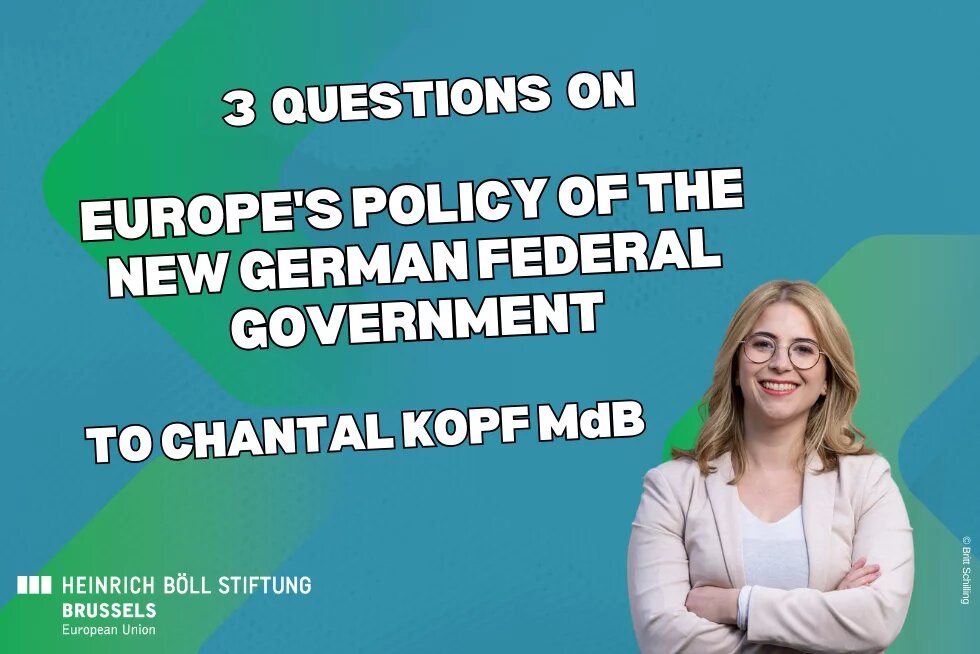With a new CDU/CSU–SPD coalition government in Berlin, the future direction of Germany's EU policy is in the spotlight. As the largest EU Member State, any shift in Berlin will inevitably echo across Europe. There are a lot of hopes and expectations and of course challenges that this coalition government will have to navigate. We asked Chantal Kopf MdB, the Europe Spokesperson for the German Green Parliamentary Group in the Bundestag, what this new coalition means for the EU.

1. What are your expectations for the expected new CDU/CSU–SPD government when it comes to European policy?
Germany’s role in Europe has never been more vital: Putin’s war of aggression continues to destabilize Europe’s peace architecture and attacks our shared values. At the same time, Trump’s erratic foreign policy undermines trust in the transatlantic alliance and threatens Europe’s economy through rising protectionism. Within the EU itself, far-right forces are putting democratic institutions under increasing pressure. In this challenging context, I expect the new German government to act with clarity and determination. It must not only reaffirm its commitment to European integration but also take meaningful steps to reinforce it—both institutionally and financially.
That begins with better coordination across German ministries and extends to taking leadership in the negotiations for a future-oriented EU budget. These negotiations should be approached not as a technical exercise but as a political opportunity to respond to today’s key challenges. This means setting clear priorities: strengthening Europe’s defence capabilities and supporting Ukraine’s future, safeguarding democracy and the rule of law, building a competitive economy aligned with ambitious climate goals, and enhancing Europe’s ability to act on the global stage.
2. How do you assess the coalition agreement from a European perspective? Does it offer a clear vision for Germany’s role in the EU?
In my opinion the coalition agreement is underwhelming. While it references well-known buzzwords like the Weimar Triangle, treaty reform, and strategic sovereignty, it lacks the ambition, direction, and political will needed to shape Germany’s role in Europe. What’s missing is a coherent profile and a forward-looking vision for deeper European integration. This absence becomes especially clear in some of the new government’s concrete plans – which directly contradict the spirit of a united Europe. The proposal to permit pushbacks of asylum seekers at the German border is in violation of EU law and has already undermined trust among neighbouring Member States, as criticism from Poland and Austria illustrates.
That said, there are also elements that give reason for cautious optimism. The agreement identifies real structural weaknesses in Germany’s internal coordination of European policy. It remains to be seen whether the new setup will lead to improved cooperation and clearer communication in the day-to-day work in Berlin and Brussels.
3. What role will you as Europe spokesperson and the new German Green Parliamentary Group in the Bundestag play in this regard?
First and foremost, we need to acknowledge that our role has fundamentally changed. As an opposition party, we no longer shape European policy from within the government. Instead, our focus must shift to using parliamentary tools to defend the progress we’ve made. This will include protecting the Green Deal and Europe’s climate targets – together with our colleagues in the European Parliament – against mounting pressure from the political right, parts of the Commission, and parts of the Merz government.
We will also insist on transparency and full parliamentary involvement in EU decision-making. The Bundestag must not be sidelined by vague declarations or ineffective superficial compromises. We will hold the government accountable, demand clarity in its positions, and push for honest answers on key legislative developments from Brussels.
Beyond this, we intend to strengthen ties with European partners through parliamentary diplomacy and cooperation with civil society, academia such as Böll experts, and with our Green colleagues in the European Parliament. We will continue developing ideas and advancing proposals for a strong, democratic, and united Europe.
The views and opinions in this article do not necessarily reflect those of the Heinrich-Böll-Stiftung European Union.


